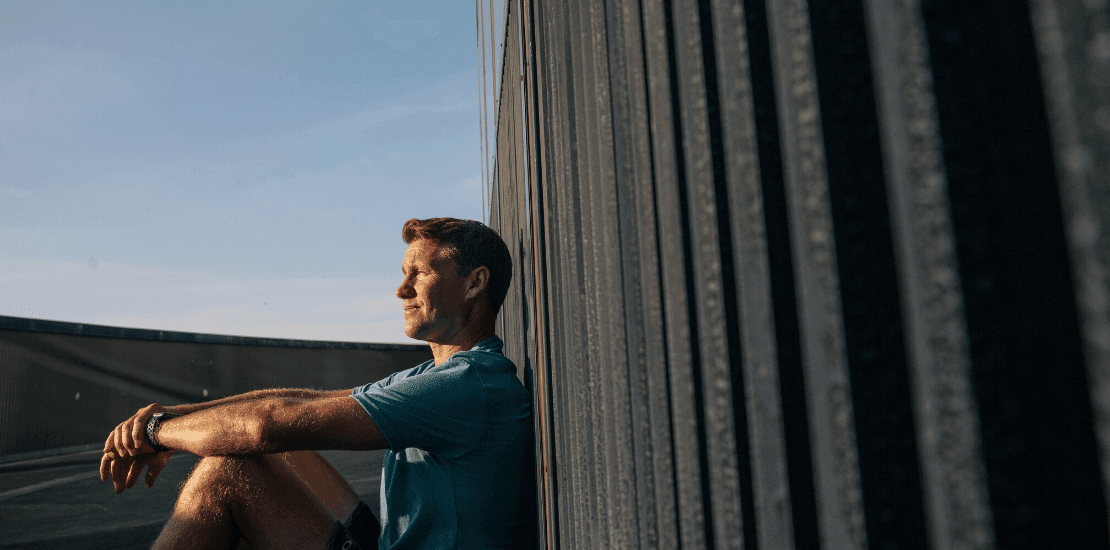The treatment that gave Andrew his life back

Any oncologist will tell you that what works for one patient won’t necessarily work for another—even if they have the same diagnosis. All treatment plans must be tweaked and tailored depending on how the person’s body responds, which is why investment to continue and progress medical research is still so desperately needed.
Keen surfer and cyclist Andrew Duke, aged just 38, knows all about this. What he assumed was an old sports injury turned out to be stage four metastasised renal cell carcinoma. Kidney cancer. He was only 36 when he was diagnosed, with no family history of cancer. For a young, fit athlete like Andrew, a diagnosis like this was incredibly rare, indescribably devastating and—to make matters worse—it was a long time coming. By the time Andrew learned what was causing the pain in his hip, the cancer had already spread to his lungs. Andrew’s sports physician—the third he had consulted—ordered a scan for a suspected hernia.
“The sonographer spent about five minutes scanning my upper-right side compared with 20 seconds on my left side,” Andrew explains.
“I knew he had found something, but cancer wasn’t even on my radar.”
Andrew’s doctor broke the news late that afternoon as he was preparing to meet his brothers for a family birthday dinner.
“I felt sorry for her because she was a sport physician used to telling people they had a torn hamstring—not a terminal illness.
“She looked me in the eye and told me I had stage four renal cancer. The scan had shown a very large tumour on my kidney. My first dumb questions was: ‘Is stage four bad?’
“She told me it had already spread to my lungs. Both of them.
“My sister is a dialysis nurse so I knew you could live without a kidney, but you can’t live without your lungs,” says Andrew, who told his brothers and his mum that night.
“My mum was a registered nurse. She broke down in tears, understanding the severity of my diagnosis.”
Surprisingly, Andrew was able to sleep well that evening.
“I woke at 5am, the same time I do every day, and then the events from the previous day hit me. I lay there and shed a few tears.
“I let myself cry for a few minutes before I told myself crying wasn’t going to help. Being angry wasn’t going to cure me and being worried wasn’t going to help me either. I forced myself to get out of bed and put my gym gear on.
“That realisation had a huge impact on my mental health and motivated me to keep living life as normally as I could.”
Andrew successfully had his kidney tumour removed three weeks later—even though doctors said it couldn’t be done. He waited three months for another scan, one he was hoping was good news. Unfortunately, the tumours had become much bigger and grown in numbers, ruling out any further surgery options. But during it all, Andrew still had hope. He looked at an immunotherapy trial for drugs not yet on the Pharmaceutical Benefits Scheme (PBS) that could save him $120 000 a year in treatment.
“I decided against it because there was a chance of severe side effects,” explains Andrew. Andrew instead opted for the drug treatment that was considered the gold standard for kidney cancer. But within two weeks Andrew began suffering from vomiting, diarrhoea, high blood pressure, nose bleeds, mouth ulcers and deteriorating vision. Within a month, Andrew’s hair and skin had started to turn white and his thyroid had stopped working.
“The side effects were so bad I couldn’t leave the house in case I needed the bathroom. I looked like a ghost,” Andrew said. Luckily, it wasn’t all for nothing and the drug had slowed the progress of his cancer in his lungs. After eight months however, in February 2018, the drug stopped working. Andrew was devastated all over again.
“The tumours had doubled in size and immunotherapy was now my only option,” he says.
Fortunately, the immunotherapy treatment he’d looked at earlier had recently been added to the PBS. Andrew had to get onto the treatment quickly. He was referred to the team at Mater’s Cancer Care Centre, who were there for him during his regular treatments, which involved an infusion every two weeks. Three months after commencing immunotherapy, Andrew’s side effects from the original drug had all but disappeared. There were notable changes in his first scan, and the tumours have shrunk significantly over time. Over a year on, just four dormant ‘spots’ now remain on Andrew’s lungs—down from 10 when he first switched from the original drug.
“Now that the side effects are gone, I’m as active as I was before my diagnosis,” Andrew said.
“Ongoing research into better cancer treatments is so important because you need options. I only lasted eight months on the kidney drug, but another guy lasted five years”
By supporting Mater’s Cars for Cancer Lottery, you are funding vital medical research into better immunotherapy options that could change the game for people like Andrew.
Please purchase your tickets today.
